Autism
Thank You to our 2023 Ambassadors!
December 31, 2023As we reflect on 2023, we are filled with gratitude for the amazing kids and families who have allowed us to spotlight their journeys through our therapy services, the true champions of our mission – our 2023 Schreiber Ambassadors!

It is through your tireless efforts that you’ve helped spread awareness about the vital work we do at Schreiber. Your advocacy has not only shone a spotlight on the challenges faced by those we serve but has also illuminated the pathways to hope and healing that our organization provides.
Your participation in our fundraising initiatives has been nothing short of extraordinary. By leveraging your networks and utilizing your influential voices, you’ve helped reach and exceed our goals all year so that we can continue making a meaningful difference in the lives of all #SchreiberKids. Your commitment to the betterment of our community is not only commendable, but also deeply appreciated.
As we express our gratitude, we also want to acknowledge the impact you’ve had on fostering a sense of community and belonging within the Schreiber family. Your enthusiasm has resonated with others, creating a ripple effect that strengthens the bonds of support and solidarity among those who share a connection to our organization.
In recognition of your exceptional contributions, we want to express our deepest appreciation. Your willingness to be ambassadors for Schreiber has not only elevated our mission but has also touched the hearts of those who have had the privilege of hearing your stories.
Thank you, 2023 Schreiber Ambassadors, for everything you’ve done to support our mission this year!
Support the therapy and education of our current and future Schreiber kids by donating to our Kids’ Care Fund today!
As a nationally recognized pediatric facility, the Schreiber Center for Pediatric Development provides family-centered education and therapy programs for infants, children and adolescents with disabilities, developmental delays, and acquired injuries. Our goal-oriented approach maximizes each child’s ability to function independently within the community.
Navigating New Year’s Eve with Kids on the Autism Spectrum: A Guide to Sensory-Friendly Celebrations
December 21, 2023New Year’s Eve, a night of joy and anticipation for many, can pose unique challenges for families with kids on the autism spectrum or those with sensory processing disorders (SPD). However, with thoughtful planning and a touch of creativity, you can ensure a more comfortable and enjoyable celebration for your child. Our therapists have shared valuable insights and suggestions to help you navigate New Year’s Eve with your child on the autism spectrum or with SPD.
Celebrate at Noon or with a Different Time Zone

Consider breaking from tradition and celebrating the arrival of the New Year at noon instead of midnight. This alternative allows your child to partake in the festivities without disrupting their bedtime routine. If noon feels too early, consider celebrating with a European country’s time zone (e.g., 7 PM ET for London or 8 PM ET for Paris), allowing your child to enjoy the excitement while still maintaining a reasonable bedtime.
Explain New Year’s Eve & What They Can Expect
Take the time to explain the global celebration of New Year’s Eve and any specific traditions your family follows. Address the possibility of fireworks in the neighborhood by describing the sounds and emphasizing their safety. Watching fireworks videos on platforms like YouTube can familiarize your child with the visual and auditory experience. Consider skipping loud noise makers and opt for quieter more familiar toys if your child enjoys making noise.
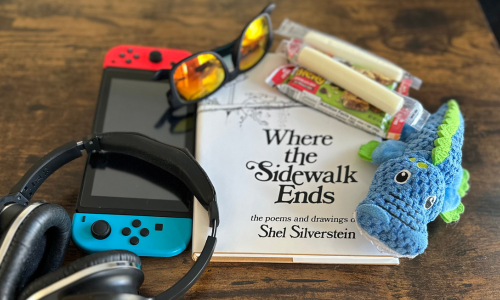
If you plan to go out, discuss the event with your child and establish a “safe space” or escape plan. Prepare a sensory-friendly kit with items such as sunglasses, headphones, books, portable toys, comfort toys, and familiar foods to ease stress during celebrations at a restaurant or another location.
Host the Party at Home
Hosting the New Year’s Eve party at home provides greater control over the environment, ensuring a comfortable space for your child. Designate a quiet retreat space in advance, equipped with dimmed lighting, a sound machine, soft pillows and blankets, weighted blankets, and sensory tools your child uses for a sensory diet.
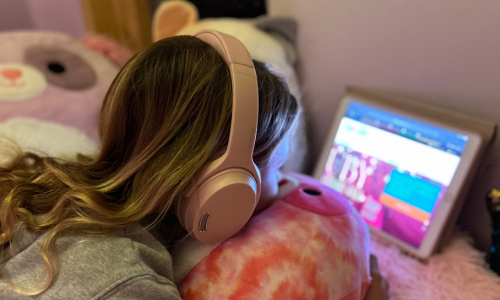
When hosting the celebration at home, engaging your kiddo in the planning process can significantly alleviate any anxiety they might feel about the event. Include them in planning the guest list, so that they know who will be there. Allow them to be a part of setting the menu, so they know there will be food that they enjoy. If they enjoy cooking, you can even encourage them to help you prepare the food.
Decorations, though essential, can overwhelm kids with ASD or SPD. Empower your child to select and hang streamers and balloons, ensuring a comfortable atmosphere. If they love arts & crafts, consider letting them make their own ball for the ball drop out of balloons, foam, play doh, cardboard, or even paper mâché. When the moment comes, drop this ball from a deck or simply throw it up into the air.
Plan a Fun Family Night In
Create a cozy fort in the living room using old bedding, comfortable pillows, and blankets and enjoy a family movie in the fort. Consider using a weighted blanket to reduce anxiety, especially if your neighborhood gets loud during New Year’s Eve celebrations.
If your family enjoys board games or puzzles, plan a night of bonding and fun around the table. This relaxed setting allows for quality family time without the sensory challenges of larger gatherings.
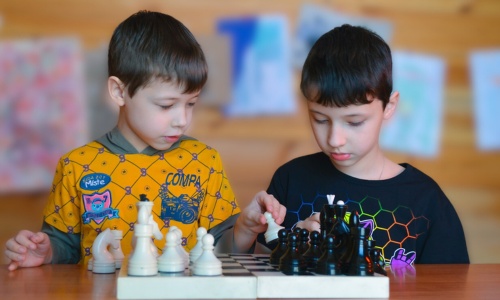
Encourage your child to create a memory book of their favorite moments from the past year. This can be a creative project, incorporating drawings, colors, or even a written story. The best part? You can keep this as a keepsake to revisit every year.
Help your children write down their New Year’s resolutions. If they love arts & crafts, supervise them while they cut up old magazines or help them print out pictures from the internet for a vision board of their goals that can be hung in their room for inspiration in the upcoming year.
Keep Your Plans Flexible
Remember, flexibility is key. Be prepared to adapt plans or even leave an event early if needed. Additionally, consider using a soothing sound machine for light sleepers to ease bedtime, especially if fireworks are expected in your neighborhood. With careful planning, you can create a New Year’s Eve that is enjoyable for your child and the entire family.
If you are interested in learning more about how Schreiber’s Pediatric Behavioral Health Services and Occupational Therapy Services can help your child visit http://www.schreiberpediatric.org/behavioral-health/
As a nationally recognized pediatric facility, the Schreiber Center for Pediatric Development provides family-centered education and therapy programs for infants, children and adolescents with disabilities, developmental delays, and acquired injuries. Our goal-oriented approach maximizes each child’s ability to function independently within the community.
Carter Peiffer: Back from the brink
March 17, 2022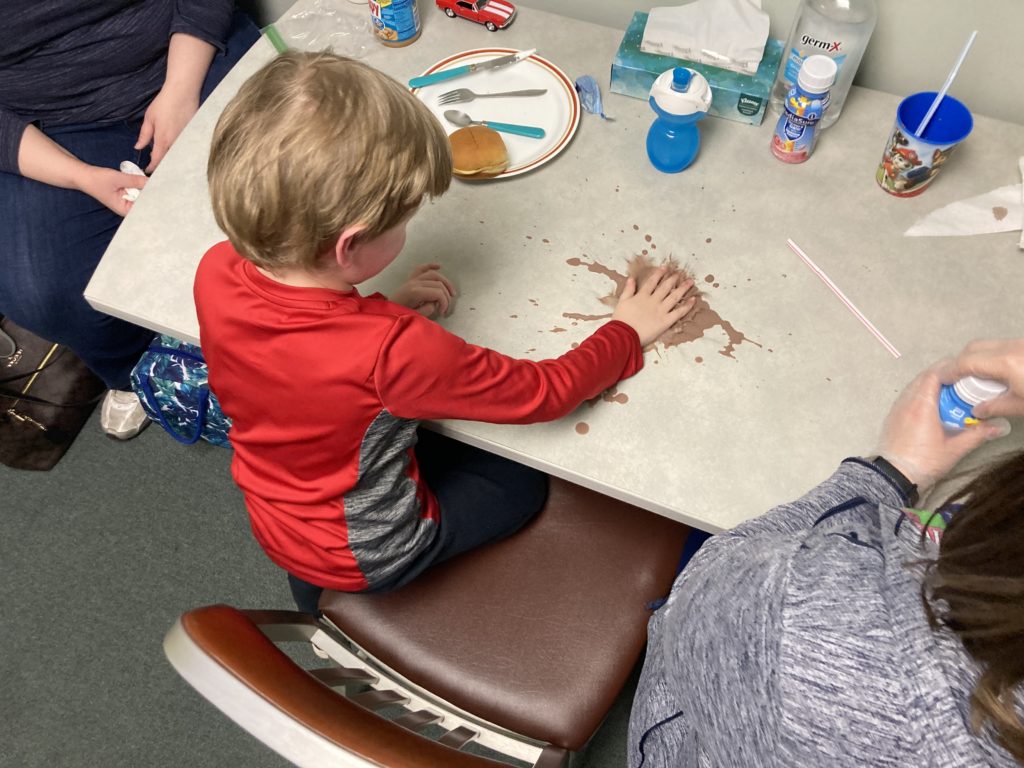
For Carter Peiffer, an occupational therapy session with Sarah Terry will usually involve food. And making a mess with food.
The mess is by design. A puddle of PediaSure on the table is fair game for Carter to write his name in, drive a toy car through or give a sip to Elmo. He might pull a straw from a cup filled with the nutrition drink and sniff (good) or take a tiny taste (better) from the end of the straw.
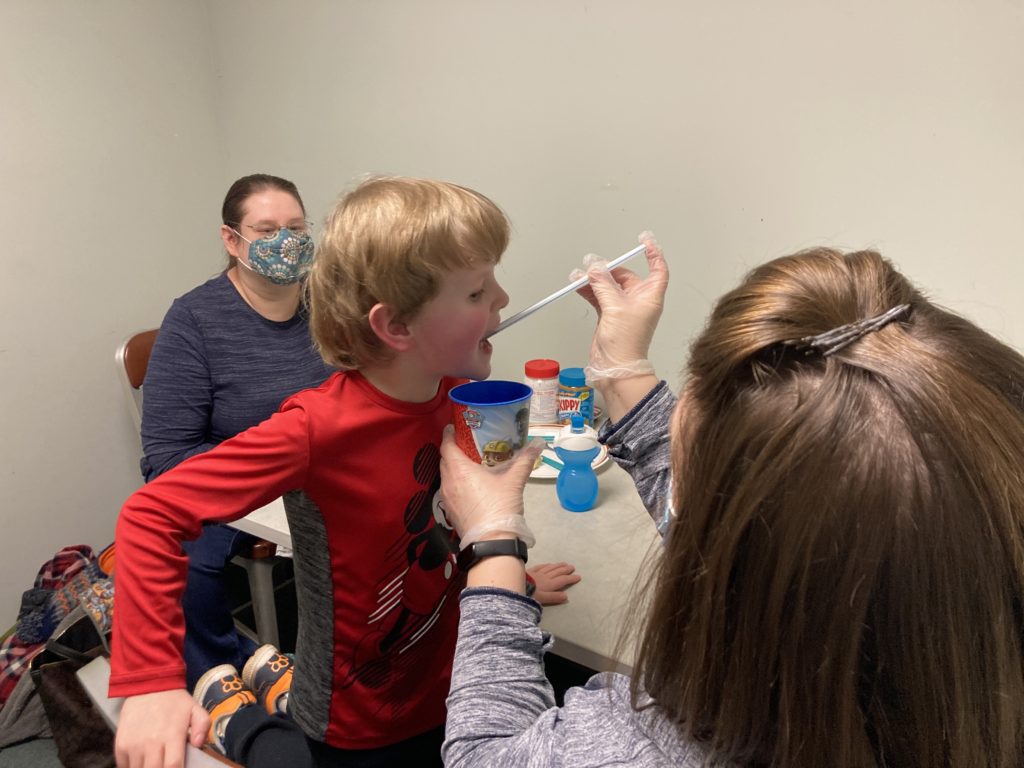
It’s all about making food fun for Carter, giving him positive experiences. He and food have had a rough two years. Through a series of life events, Carter went from a happy, active 2 year-old who would eat lots of different foods to a 4 year-old who would only eat strawberry banana yogurt — and it had to be Gerber’s. The lack of variety and nutrition in his diet over time left him with a severe vitamin C deficiency and a case of what used to be called scurvy. That caused his bones and muscles to weaken, to the point where his bones became brittle and he couldn’t walk or even stand without help.

Let’s go back to the beginning. When he was 2, his mother Desiree said she noticed Carter was a little delayed in speech. But he was otherwise active and healthy. Then he gradually began to cut out some foods, starting when Carter’s brother was born. Around the same time, his grandmother was in the hospital for an extended period following heart surgery.
These new stresses in his life caused him to become even more picky with his eating, to the point where all he would eat was the yogurt.
In March a year ago, Carter was running around playing when he tripped and fell. He ended up breaking the growth plate in his left knee, which required a knee immobilizer. A month later, he fell again — still wearing the immobilizer on his right knee — and broke the growth plate in his other knee.
After another round of medical visits, doctors at Children’s Hospital of Philadelphia in May found multiple tiny fractures in his bones and sent him to CHOP’s emergency department for an immediate, intensive examination.
Their conclusion: Carter’s increasingly limited diet for more than a year had caused a dangerous vitamin C deficiency that had weakened his bones and left him susceptible to fractures. His overall medical state was as fragile as his little brittle bones.
He spent nine days at CHOP in May receiving treatment and starting inpatient therapy. Later that month, after he was sent home, Desiree called Jen Bachman, our social services director, to arrange starting services at Schreiber.
In early June, Carter had his first physical therapy visit. After not being able to put any weight on his legs because of his knee injuries, step one in his recovery was relearning how to walk. He did aquatic therapy in our therapy pool with Megan Campbell Roland, and PT in the gym with Laurie Panther.
Desiree said Laurie noticed some sensory issues and suggested Carter be evaluated for occupational therapy. In September, doctors diagnosed him with autism and sensory processing disorder, and he started working with Sarah for OT. The work there has focused on helping him expand the variety of foods he ate.
“Carter, what did you eat today?”
Sarah asked the question at the start of a recent therapy session.
“Some peanut butter bread, and I ate some hot dog!”
“You did not,” Mom said. She smiled and gave him a what-are-you-talking-about look. “You had some yogurt.”
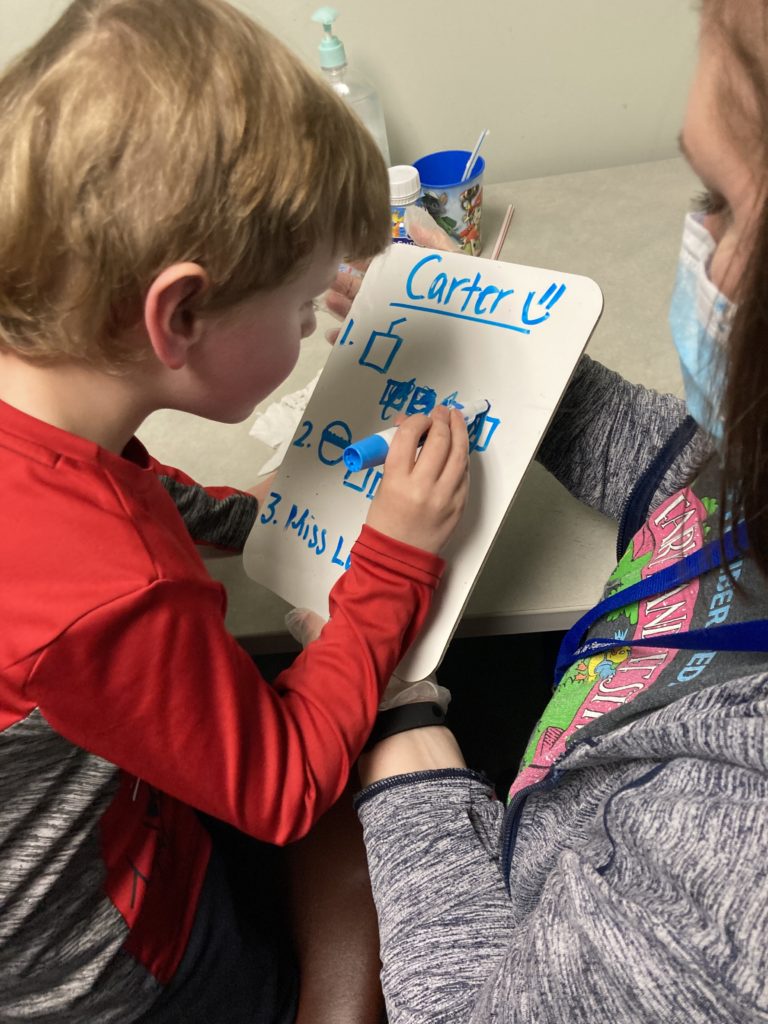
“Yogurt,” Carter repeated back, and then swirled some PediaSure around the table with his fingers.
Sarah had a dry erase board next to her with Carter’s eating goals for the session written in blue marker. When Carter accomplished one of his tasks for the session, Sarah had him fill in the box next to that task on the white board.
The work with Sarah on eating is paying off. Desiree said Carter weighed 29 pounds when he arrived at CHOP a year ago and 32 pounds when he left. Today, his weight consistently ranges between 42 and 45 pounds.
“Sarah got him to eat peanut butter and marshmallow (sandwiches),” she said. “He started eating chips. He tried an animal cracker and a pretzel. He seems to like the crunchy stuff.”
It’s a constant process, sometimes painfully slow, sometimes with setbacks.
“When he gets derailed, when he gets sick, he shuts down (and stops eating),” she said. “I’ve had to stay up all night with him to give him water, because getting dehydrated would mean we’d have to go to the ER.”
The progress is obvious, and not just with his eating.
“He’s able to walk and run and is almost back to where he was before all this started,” Desiree said. “He plays on the playground. He goes up and down steps. He’s able to express himself more now.”
Later, she talked with a lot of emotion about what she has seen bringing him to every appointment for the past nine months.
“To see his progress has been amazing. I know (coming to Schreiber) will all end at some point, but everybody has been so amazing. They are like family here, and Carter loves being here.”
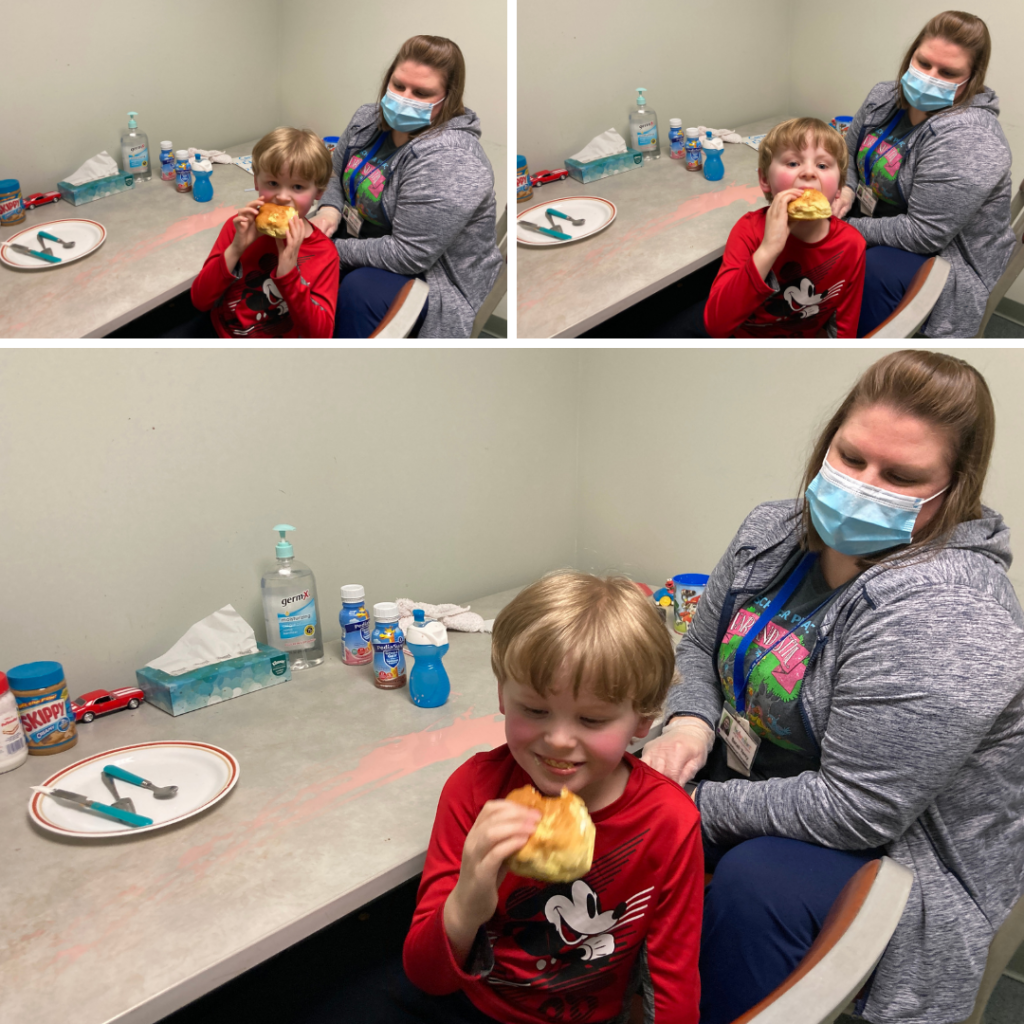
After taking two tentative tastes of a strawberry nutrition drink, Carter finishes the session with a reward: a bite of his peanut butter sandwich.
Schreiber mom: From advocate for others to advocate for son
December 17, 2021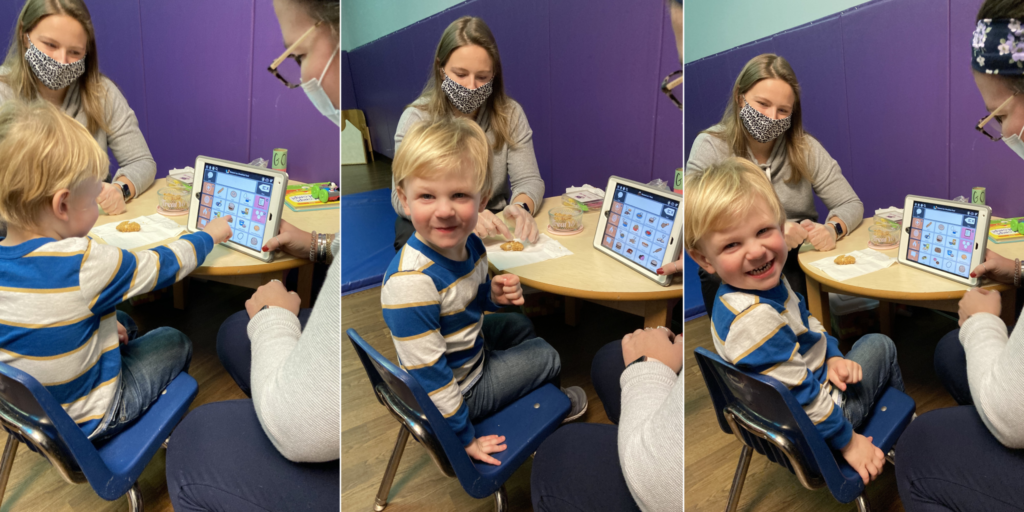
Amanda Katchur is a psychologist who has been an advocate for services that support children for a number of years. Now, she’s learning to advocate for her own child, and that’s a completely different experience.
It’s one thing to know professionally the impact that Schreiber’s services and Lancaster County’s Early Intervention program have on families. It’s another thing to see it personally.
Her daughter Bethany was diagnosed as an infant with torticollis, a condition in infants that causes a baby’s head to tilt constantly to one side. Thanks to the work of Schreiber therapists, Bethany’s torticollis is gone and she runs, jumps and dances just like any 6-year-old little girl, Amanda said.
Bethany’s little brother Leo, 3 years old, has an autism diagnosis, was born with mild hearing loss and also had some torticollis as an infant. The three issues combined have left him behind in several areas of development. When it was time for Leo to receive services through Early Intervention, at 6 months old, Amanda had no hesitation.
“I knew we wanted to come back (to Schreiber) because we had such a positive experience with Bethany,” Amanda said.
Leo has been in good hands his therapy services started. Catherine Donahue was his Schreiber’s Early Intervention specialist for home visits. Dorlas Riley was his speech-language pathologist. Denisha Roberts worked with him in physical therapy. And Bernie Hershey has been his occupational therapist.
I like to think that we’ve been fortunate to have, like, the dream team…, with all the experience they have with his issues.
AMANDA KATCHUR
“They were all really great,” Amanda said. “I like to think that we’ve been fortunate to have, like, the dream team to be quite honest with you, with all the experience they have with his issues.”
COVID has, at times, made the therapy more challenging, like when the family had to switch to telehealth services for a time. At those moments, she could see the lengths the Schreiber team would go to for a child.
When telehealth sessions switched back to in-person visits, the change and the lack of consistency caused some challenges for Leo, as it does for many kids on the autism spectrum.
“Bernie showed up at one point at our house in costume as Jessie from “Toy Story” to try to re-engage after telehealth with Leo a little bit,” Amanda said. “They just really always made an attempt (to find what) he was interested in and get into his world, which I appreciated so much.”
During a recent therapy session at Schreiber, Leo worked with Marli Hess, an intern in Occupational Therapy, and Maddy Sova, a speech-language pathologist. They were trying to help him become more comfortable with a different kind of food – in this case, a chicken nugget – and to improve his language skills by using a smart tablet to respond to questions.
“We are working on communication in whatever way Leo feels most comfortable,” Amanda said. “Today, you saw him working on some eating, because eating has been a struggle for us, too. So he’s been working on increasing his tolerance for different foods and different textures and things like that. But communication has been, I would say, the biggest one.”
Mom was impressed with the way Leo greeted a visitor to the session, smiling and waving. “He probably wouldn’t have done that six months ago,” she said.
EI services do make a difference
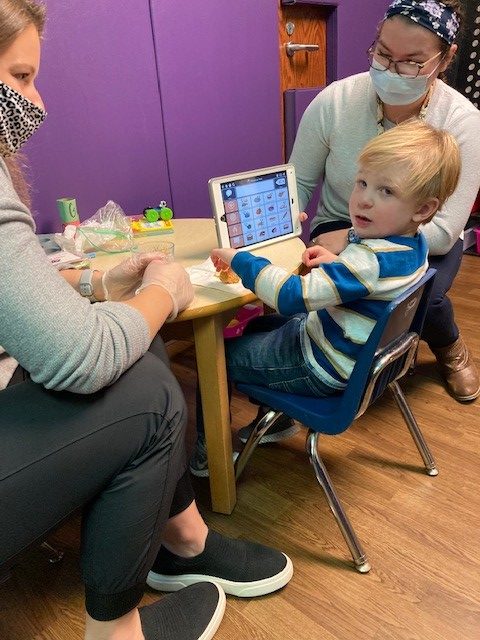
Mandy Kolb Lyons is a coordinator in Lancaster County’s Early Intervention services program. She sent this email to agencies that provide Early Intervention services after a recent presentation to the agencies by Amanda Katchur. Amanda presented at the PA Statewide Interagency Coordinating Council (SICC) meeting to share her family’s story and how Early Intervention supported them.
Here’s an excerpt from Mandy’s email:
“Amanda shared numerous examples of how you helped to coach, support, empower and guide her and her family. Amanda beamed as she shared the journey that her son and family had with Early Intervention and mentioned a few times how Early Intervention supported her entire family, including Leo’s big sister! Not only did Leo grow and progress throughout services, his entire family did. We can only hope that every family that participates in Early Intervention can walk away feeling similarly to how Amanda and her family did after participating in our services.”
Schreiber goes to the moon with therapy
July 17, 2019This week marks the 50th anniversary of the Apollo 11 moon landing. And Schreiber’s Occupational Therapy Department is using the occasion to add some moon fun to therapy sessions.

Eli Cole climbed to the top of a lunar hill (actually a huge pillow) and jumped into a small lunar lake (actually a big ball pit).
Wyatt Dennison turned a piece of paper into a rocket, slipped it over a plastic straw then had it blast off with a puff of air from his mouth.
Schreiber OT Bernie Hershey was the mission control commander who made all this lunar fun happen. Bernie likes to use current events to add a little spice to her therapy sessions.
Wyatt, 6, comes to Schreiber for OT and speech-language therapies. His mom Liz says Wyatt is on the autism spectrum, and he’s been coming to Schreiber for more than three years for help with his fine and gross motor skills and to work on sensory issues.

Wyatt Dennison and Schreiber OT Bernie Hershey launch their straw rockets at the same time to end Wyatt’s therapy session.
For the lunar crafts, Wyatt has to use fine motor skills to cut out the piece of paper that will become the body of the rocket, then cut out the fins. He then has to wrap the rocket around a pencil to form it, tape the fins to the body, then slip it off the pencil and onto the straw.
“The kids don’t really know much about the moon landing, so we’re incorporating our therapy goals into activities with a NASA or a moon-landing theme,” Bernie said. “NASA’s website had lots of ideas we were able to use.”
NASA’s Jet Propulsion Laboratory actually posted the instructions for the straw rocket on its website.
Eli works on his balance and core strength when he’s climbing the lunar hill. He also practiced his handwriting by pressing gently on “zero gravity” paper (paper on a soft surface that would allow for easy punctures).

Eli Cole jumps into a ‘lunar lake’ during a recent occupational therapy session. The exercise added an element of space fun to therapy.
Both boys also used a small hammer to smash “moon rocks” during therapy, another exercise that worked on hand-eye coordination, and walked in moon boots, that helps them practice balance and coordination.
“With everything that our families have to deal with on a daily basis, adding variety with a special theme improves motivation on even the most difficult task, like the handwriting practice,” Bernie said.
There is a little bit of the Apollo spirit in all of this, the creativity and the experimenting and the striving to be a little bit better.
And that’s a good thing. For Schreiber and for the kids.
Penn State students build a better bike for Schreiber
February 26, 2019We have a lot of therapy bikes at Schreiber. But there was a certain kind of bike we were missing: a hand bike, no pedaling, for school-age kids. Enter a group of senior mechanical engineering students from Penn State Harrisburg.
Bernie Hershey, a Schreiber occupational therapist, was the one who suggested the project to the group in September.
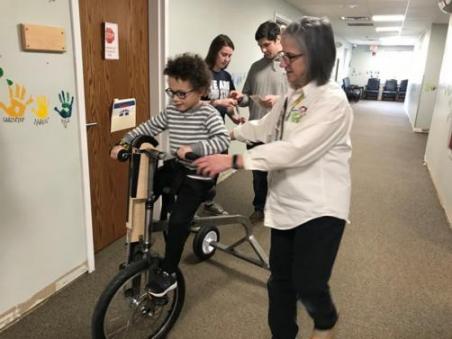
The students, all seniors — Nicole Linke, 21; Cody Mackanick, 23; Michael Ruch, 23; and Andrew Saienni, 23 — came to visit Schreiber after Nicole and Michael had interned over the summer with Arconic, a Lancaster County manufacturer. Arconic has supported Schreiber for several years by donating and sending volunteers. Nicole and Michael joined a group of Arconic employees for a service day at Schreiber that included a tour by Susan Fisher, Schreiber’s volunteer coordinator.
“We have one hand bike, and it’s too small for some of the kids that need it,” Bernie said. “Susan brought them to me, and they said they were looking for a capstone project for their senior year.”
The tour sparked their engineer brains immediately.
“When I saw this old therapy bike they had, I was intrigued,” Nicole said. “I thought that looked like something we could work on.”
The idea they developed with Bernie was to build a bike for kids ages 6-12 that would require the kids to pedal using only their hands. (Watch Zoey Zweizig do a demonstration ride in the video below.)
“We’re always looking for ways to have upper body resistance,” Bernie said. “One of the best ways to build upper body strength is to have them propel themselves through space.”
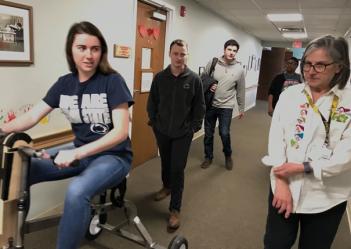
That movement triggers the release of endorphins in the brain that are pleasing and calming at the same time. Bernie saw that immediately when Owen Hull climbed on the bike. Owen is 5, and he receives occupational, physical and speech-language therapy at Schreiber. He’s on the autism spectrum, said his mom Monica Hull.
“If you noticed, the more he rode the more he talked to the college students,” Bernie said. “He engaged with those kids, which he normally doesn’t do. He was mechanically inspecting the bike and asking questions about it. Oh, I got such a charge out of it.”
The students have enjoyed the work, too. They started in September and the bike they brought this week was a first prototype. They will take it back and make adjustments based on the feedback from Bernie, and from the kids. They asked the kids what colors the bike should be, for example. The project should be finished in April and will be exhibited during Penn State Harrisburg’s annual show of capstone engineering projects in May.
None of the students knew anything about Schreiber a year ago. All are from outside of Lancaster County. But they connected right away with Schreiber’s mission and wanted to do something to help.
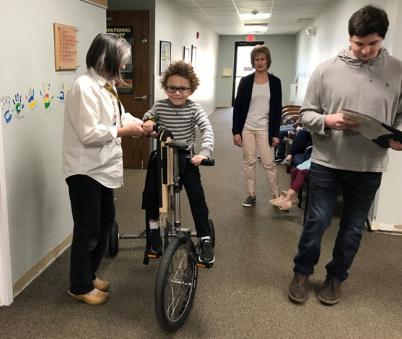
“I just liked spending a year working on something that will help someone instead of making something for a company that might not even use it,” Nicole said.
“Knowing that it would be used every day is really important,” Cody Mackanick added.
The students raised the money for the bike themselves, about $1,500 in all, through a GoFundMe page. They spent a portion of that for the materials to build the bike.
And the rest? That money they will donate that to Schreiber.
Jason Hines found his voice at Schreiber
February 8, 2018Working the checkout line at Stauffers of Kissel Hill in Lititz, Jason Hines keeps up a steady stream of chatter with every customer who comes through his line.
For some, he takes the numbers from their bill and references a date in history (he’s a history buff).
“You learn a lot of history here,” one woman told him.
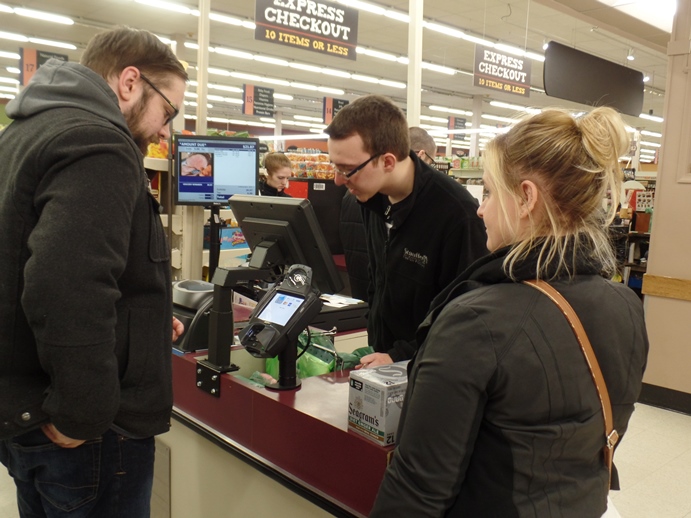
For others, he’ll share something about himself.
“This is the third anniversary of my becoming a standup comic,” he told another woman.
For every customer, he found some way to add a little extra bit of service.
“You saved 299 pennies today,” he said to one couple. “Have a great day.”
He’s 18 years old, a high school graduate working and taking classes at the Lancaster campus of Harrisburg Area Community College.
The Jason the folks at Stauffers know now is a long way from the Jason who came to Schreiber at age 3. Even before starting at Schreiber, Jason had been diagnosed with autism and was receiving Early Intervention services. Jason’s specific diagnosis, said his mom Jackie, was PDD-NOS: Pervasive developmental disorder not otherwise specified.
“I had some problems talking and had some motor delays,” Jason said.
Jackie is a special instructor at Schreiber. She knows her way around education and kids with autism and other learning disabilities. Even for her, choices could be hard. When Jason was 5 and it was time to decide whether or not to start school, Jackie was torn.
“I struggled whether to keep him in early intervention or have him start kindergarten,” she said. “Cognitively, he was ready. But his expressive language with that of a 2 year old. Ultimately we decided to send him to kindergarten, and we had plenty of support services in place.”
Initially at Schreiber, he received all threee services and special instruction from Jay Graver in the S.T.A.R.S. Preschool. Eventually, he concentrated on occupational therapy, attending Schreiber until he was 8 to work on his sensory integration, fine motor skills and attention and focus.
By middle school, he had made a lot of progress, but he still worried that he wasn’t always speaking correctly.
“Once ninth grade hit, kids stopped being jerks, and I started making more friends,” Jason said.
In high school, he flourished. He was involved in an anti-bullying program, he did plays, he sang in the choir. He joined the Unite Club, Warwick High School’s Mini-THON in support of the Four Diamonds Fund.
“I raised the most money, which made me King of Mini-THON,” Jason said.
All of his success helped him become senior class vice president and gain enough confidence to start trying to become a performer. He has dabbled in stand up comedy, telling jokes and doing impressions. He made news this month when Lancaster Online noticed that his witty patter with customers included an impression of Philadelphia Eagles play-by-play announcer Merrill Reese.
That’s how he is every day on the job at Stauffers, always a willing performer, especially for little kids. He will talk like Mickey Mouse or do voices from “Monsters Inc.” or “Frozen.” He will ask them about their favorite characters. Kids will ask moms to go to Jason’s line when they check out.
Toni Lutz, a shift supervisor for the cashiers at the Lititz store, said she knew Jason before he even started working at Stauffers. He and her daughter Madeline went to school together at Warwick.
“He’s naturally that way,” Toni said. “He’s nicer than most people. He’s just kind. It’s refreshing.”
“We Delight Shoppers” is a lyric in the Stauffers jingle, and Jason said he sang that at the end of his job interview back in 2015.
“It helped me get the job,” he said. “My charm wins people over.”
At HACC, he’s taking classes with an eye on becoming a teacher, probably an elementary school teacher. Which means he would be working with little ones on their writing and speaking and making sure they were paying attention.
And that feels just about right.
Coming to Schreiber: Essential advice on essential oils
January 11, 2018Ninette Jackson first sought out essential oils to help her dad, who suffered from Lou Gehrig’s disease. A decade and lot of education later, she has become an essential oil guru. And she’s right here in Lancaster County.
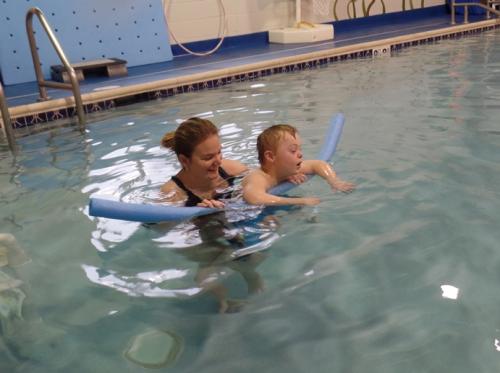
Ninette’s a lawyer by trade. But she didn’t enjoy it much. Her interest in essential oils gradually seeped into her life. The more she saw their benefits, the more she wanted to learn.
She became a distributor but saw a lot of her customers struggle with the cost. The law practice soon ended, and in 2010 Josiah’s Oils was born.
“Once I had kids, I became more interested in getting these for lower prices,” Ninette said. “I found ways to source them directly from the farms that make them. So I started a company to bring the oils in, bottle them and sell them.”
Over the years, Ninette has put in about 860 hours of study to become a certified clinical aromatherapist. Her husband Marc is an aromatherapist, meaning he hasn’t studied as much, and he manages their store on Meadow Lane in Manheim Township.
The Jacksons have five children, ranging in age from 15 to 7. In the middle is Josiah, who will be 10 in April. Josiah has Down Syndrome and visits Schreiber Fridays for physical therapy in the pool and occupational therapy.
“We’ve really enjoyed (therapy),” Ninette said. “It’s a nice way for him to get the expertise of the therapists, and it’s a great way to learn how to carry over what he does in therapy at home.”‘
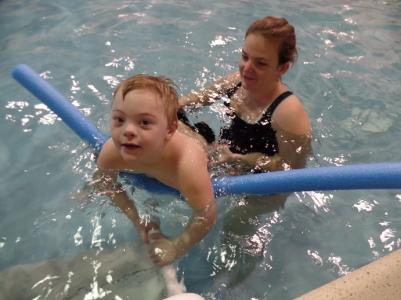
Bernie Hershey is a Schreiber occupational therapist who encourages parents to use essential oils when it’s appropriate.
“A little girl who comes for all the therapies and preschool has a diagnosis that includes difficulty paying attention to any task and anxiety,” Bernie said. “Her mother and father use essential oils in a special mixture just for her to improve her attention and allow her to attempt the skills we are working on (to improve her fine motor skills).”
Josiah has had several surgeries, and Ninette has used diffused oils to help with his post-surgery recovery.
“The doctors at (Children’s Hospital of Philadelphia) saw he needed less morphine,” she said. “Diffusing essential oils really reduces the body’s pain response.”
She doesn’t claim her products can replace traditional medicine, and she has worked in partnership with Josiah’s doctors.
“We believe in medicine; we believe in antibiotics,” she said. “I see this as a complement to what doctors are already doing. We’ll consult with pharmacists. We tell families to talk to their pediatrician. Maybe these oils can help you take one less pill to manage pain or anxiety.”
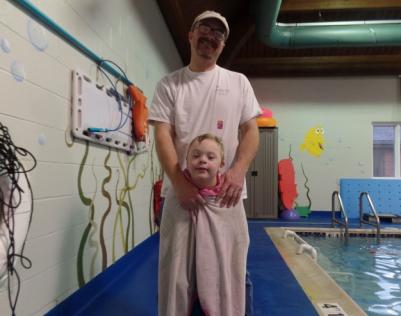
She said her customers are diverse. Many are elderly, looking to manage pain or improve sleep or help with a relative with dementia. More than 50 percent are moms looking for help for their kids, especially kids with special needs.
“We saw early on the benefits of oils, especially with Josiah,” Marc said. “We saw it making a difference in our lives.”
The Jacksons want to make a difference in the lives of Schreiber families. They will offer a free workshop here on Wednesday, Feb. 21. The event will run from 6:30 to 8 p.m.
She will talk about what not to do, how to use them safely on the skin and mention a few options for some of the common parental challenges.
“Which oils are good for what,” she said. “My child has trouble focusing: What shoud I use?”
Parents looking for help for their child with autism or ADHD or sensory issues might want to come and hear what Lancaster’s essential oils guru has to say.
Shorter wait times are a boost for Marin family
October 27, 2017It took three years from the time she was referred until Luis was finally able to start receiving services in 2013. That’s how long the wait times were for speech therapy.
With her second son, Kevin, doctors detected hydrocephalus during the pregnancy, and he was born in 2013 with his own set of complications.
At 14 months old, when it was time for him to begin services at Schreiber, Velveth said Kevin was able to start almost immediately.
“Very different,” Velveth said. “I’ve told friends to come here for services, and they got right in, too.”
Whether the wait has been long or short, Velveth said the benefits of coming to Schreiber have been the same: amazing.
With Luis, at the time of his diagnosis at age 3, he was nonverbal. By the time he started at Schreiber, when he was 6, he still wasn’t speaking.
“‘Mama,’ ‘Dada,’ that was it,” Velveth said.
He started in Speech-Language Therapy with Barbara Miller — “Miss Barbara,” Velveth called her.
“She started working with him,” she said. “After two or three months, we could see he was paying attention and starting to understand directions. … Then he started saying things. Probably when he was 7, he was speaking.”
Luis is in fifth grade now, doing well in a classroom for students with autism.
“He’s a good kid,” Velveth said. “He’s learning to express himself. He gets along with other kids. He has started to draw and have an imagination. Miss Barbara is the angel that opened the door.”
“Doctors said he’d never walk or eat by himself,” Velveth said. “When we started here, he couldn’t sit. He would just lay in bed.”
He began his physical therapy at 14 months with Lisa Stachler Volk, who showed Velveth how to help Kevin sit and how to massage his legs to help improve his muscle tone. At 18 months, Kevin started to roll over. Then he was fitted with braces and started learning to stand.
He’s 4 now, and he walked from his stroller back to a recent therapy session with no assistance, although he still wears a brace to support his weaker left side. He also receives occupational therapy to reduce his anxiety about walking on different surfaces. His brain had difficulty processing going from grass to the mulch of a playground, for example.
“He used to cry and cry and wouldn’t do it,” she said. “Now he can do it. All these little things he’s doing, like going down a slide, they’re normal for other kids. They’re so amazing for us.”
She has seen him progress in other ways, too. He used to be anxious about different food textures and would only take liquids; now he’s learning to chew. He’s much calmer and more confident. He sleeps better.
All of which is to say: Schreiber and the Marin family found each other at the right time.
The Extraordinary Give is coming
October 5, 2017UPDATE, 10/23: The first 500 visitors to light one of our luminaries will receive a free Stroopie from Lancaster Stroopies. If you haven’t had one of these, yet, don’t wait. Come to Schreiber on Nov. 9, light a candle and get a Stroopie.
UPDATE, 10/12: We confirmed that we will have our Extra Give party at the Federal Taphouse, at the corner of Queen and Chestnut streets, and just two blocks from the big Extra Give party at Lancaster Marriott at Penn Square.
UPDATE, 10/19: We will be at the Federal Taphouse throughout the day on Nov. 17, starting when they open for lunch at 11:30 a.m. When you are out and about downtown that day, stop in for lunch, dinner or drinks, and take a minute to donate to Scheriber. FM97’s DC will be on hand to play music from noon to 6 p.m. If you come by after work, we’ll have live music by Jen and Brad Rhine from Blue Sky Falls from 6-7, followed by MOE Blues from 7:30-8:30.
UPDATE, 11/16: We gratefully acknowledge support from three companies providing Business Matches for this year’s Give: Atlee Hall, Mid-Atlantic ProTel and Medisys Solutions.
Step 3: Remember to give extra during the Extra Give. Your past support has meant so much to us, but the demand for our therapy services continues to surge. Every dollar you donate helps us serve as many children as possible.
Please consider donating to Schreiber during the Extra Give on Nov. 17. When you give extra, extraordinary things happen.